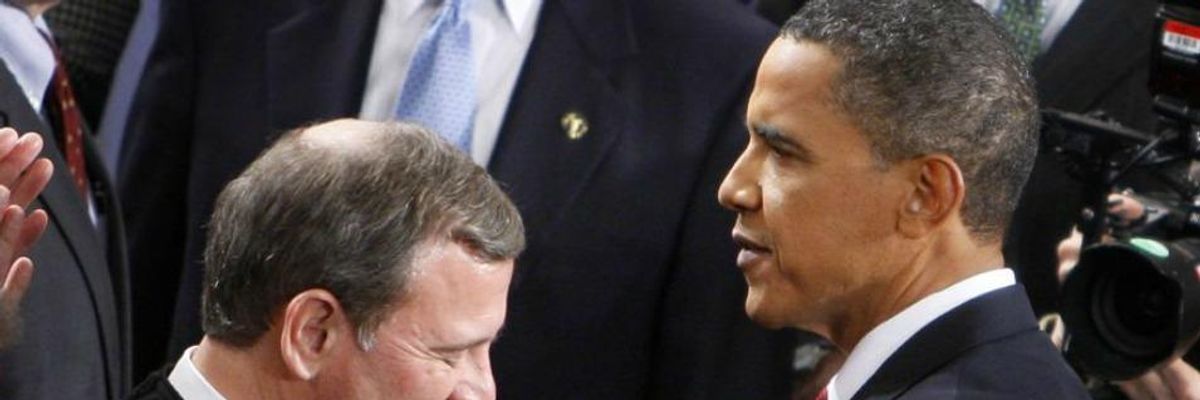As the 2016 presidential campaign season hits full stride with hundreds of millions of dollars pouring in from outside funding groups, democracy reformers are zeroing in on the one person they say could stem the flow of money into electoral politics: U.S. President Barack Obama.
"President Obama has no one to blame but himself for his failing legacy on money in politics," said Kurt Walters, campaign manager at Rootstrikers, a project of the national grassroots group Demand Progress that focuses on the corrupting influence of anonymous, unlimited political spending. "It's cynical even by Washington standards--Obama has said for six years that he's outraged at Citizens United but hasn't bothered to do anything to combat the decision's effects."
Both on the campaign trail and in the halls of Congress, Obama has repeatedly denounced the Supreme Court's 2010 Citizens Unitedruling. During his 2010 State of the Union address, Obama lambasted the justices over the decision, saying that it would "open the floodgates for special interests--including foreign corporations--to spend without limit in our elections."
However, according to a report (pdf) published by Rootstrikers on Tuesday, the president has failed to live up to this rhetoric and instead has only enabled the unprecedented flow of money into the current election cycle.
Among the measures within the president's power that he has so far avoided, the study notes, would be an executive order requiring "large federal contractors--including 70 percent of the Fortune 100--to disclose their political spending."
Further, last year Obama signed into law a budget bill that included a provision allowing a six-fold increase in the contribution limits donors can contribute to political parties.
A number of Obama's appointees have also failed in this regard, or even worsened campaign finance disclosure rules. For example, Mary Jo White, who Obama chose to lead the Securities and Exchange Commission (SEC), "removed a rule to require public companies to disclose their political spending from the regulatory agenda."
What's more, the report notes, over the course of his presidency, Obama has broken a series of pledges on campaign finance, including: "failing to push for public financing of elections after campaigning on the idea, violating his pledge to not have his associates fundraise for any super PAC supporting his 2012 bid, and allowing corporate contributions for his second inauguration festivities after disallowing them in his first inauguration."
More than three-quarters of Americans want to see Citizens United overturned and more than 100,000 have so far signed on to a petition calling on Obama to take some action against "the influx of secret money in elections" before his next State of the Union address.
"We've seen Obama take bold executive action to live up to principles he campaigned on, from blocking the Keystone Pipeline to using his bully pulpit to support true Net Neutrality," wrote former New York gubernatorial candidate Zephyr Teachout and Demand Progress co-founder David Segal in a recent op-ed announcing the petition campaign.
"Now," they continued, "the president has a clear choice: he can take action to fulfill his promises of weakening the influence of big money in politics--or he can cast himself as just another politician who campaigned on empty promises of cleaning up a corrupt system."

